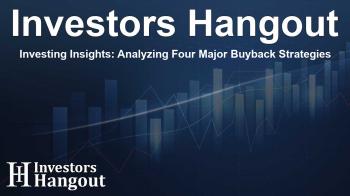Investing Insights: Analyzing Four Major Buyback Strategies

Understanding the Impact of Buybacks on Company Performance
In recent times, a number of corporations have initiated notable buyback programs, reflecting their commitment to returning capital to shareholders. This article reviews four particular companies making headlines due to their significant stock repurchase efforts. These buybacks vary in scale but demonstrate a general trend toward rewarding shareholders, which can influence market sentiment.
1. Regeneron Pharmaceuticals: Capitalizing on Strong Results
Regeneron Pharmaceuticals (NASDAQ: REGN) reported robust earnings for the fiscal year and introduced a $3 billion buyback program. This program, when combined with existing authorizations, grants the company a total buyback capacity of $4.5 billion, or approximately 6% of its market value. In addition to the buyback, Regeneron has launched a quarterly cash dividend program, offering $0.88 per share which will be paid to shareholders shortly. This indicates an evolving strategy that balances buybacks with direct shareholder returns, improving overall investor confidence.
2. PayPal: Massive Boost in Buyback Authorizations
PayPal (NASDAQ: PYPL) has recently announced an extensive $15 billion stock repurchase plan, bringing its total buyback authority to nearly $20 billion, which represents about 25% of the company’s overall market capitalization. Despite a solid earnings report showing growth exceeding analyst expectations, PayPal’s stock experienced a decline. This paradox occurs as concerns about certain metrics, such as branded payment volumes, create unease. In response to these challenges, the CEO emphasized the importance of the brand’s checkout services, suggesting a focused approach to improve service delivery and regain investor trust.
3. UBS: Navigating Challenges Amid Buyback Plans
UBS Group (NYSE: UBS) has announced a $3 billion buyback authorization as a signal of its strong profit performance, particularly noting a net profit of $770 million. However, the uncertainty stemming from possible new capital requirement regulations introduces complexity into these ambitious buyback plans. UBS plans to execute $1 billion in stock repurchases in the first half of the year, followed by another $2 billion. Market participants are keeping a watchful eye on upcoming regulatory decisions that could impact the feasibility of their buyback strategy.
4. Jacobs Solutions: Significant Growth and Shareholder Returns
Jacobs Solutions (NYSE: J) stands out with a significant buyback program, launching a $1.5 billion authorization alongside existing capacity from a prior program. With a total buyback capacity approaching 11% of its market cap, Jacobs has an impressive commitment to enhancing shareholder value. The company’s performance indicators also reflect positive trends, as revenue increased by 5% and its backlog surged by an impressive 19%, escalating demand for its wide range of consulting services. However, a slight decrease in adjusted EPS signals areas needing attention.
Frequently Asked Questions
What is a buyback program?
A buyback program is when a company repurchases its own shares from the marketplace, reducing the number of outstanding shares, which can increase earnings per share and support stock price appreciation.
Why do companies initiate buyback programs?
Companies initiate buyback programs to return excess cash to shareholders, increase stock values, and project confidence in their financial health, particularly during strong earnings periods.
How do buybacks affect shareholders?
Buybacks can benefit shareholders by driving up the share price and providing dividends, contributing to overall shareholder value enhancement.
What are the risks associated with buyback programs?
Risks include potential overvaluation, where funds could be better utilized in growth initiatives rather than stock purchases, and market reactions if a company faces unexpected challenges.
Are buybacks always good for investors?
While buybacks can create immediate value, they are not universally beneficial. Investors should assess the broader financial strategy of a company along with market performance.
About The Author
Contact Owen Jenkins privately here. Or send an email with ATTN: Owen Jenkins as the subject to contact@investorshangout.com.
About Investors Hangout
Investors Hangout is a leading online stock forum for financial discussion and learning, offering a wide range of free tools and resources. It draws in traders of all levels, who exchange market knowledge, investigate trading tactics, and keep an eye on industry developments in real time. Featuring financial articles, stock message boards, quotes, charts, company profiles, and live news updates. Through cooperative learning and a wealth of informational resources, it helps users from novices creating their first portfolios to experts honing their techniques. Join Investors Hangout today: https://investorshangout.com/
The content of this article is based on factual, publicly available information and does not represent legal, financial, or investment advice. Investors Hangout does not offer financial advice, and the author is not a licensed financial advisor. Consult a qualified advisor before making any financial or investment decisions based on this article. This article should not be considered advice to purchase, sell, or hold any securities or other investments. If any of the material provided here is inaccurate, please contact us for corrections.

